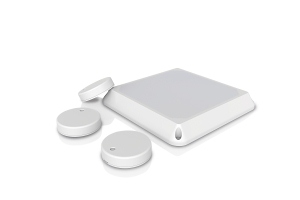Ruuvi Node open source node solution combines nRF9160 SiP and nRF52840 SoC

Nordic Semiconductor announced that a unique, open-source, multi-purpose, industrial-grade cellular gateway, environmental sensing, and asset tracking node solution from Finnish open-source electronics specialist, Ruuvi Innovations, employs both a low-power Nordic nRF9160 SiP cellular IoT module (LTE-M and NB-IoT) and an ultra-low power Nordic nRF52840 Bluetooth 5 multi-protocol (Thread, Zigbee) SoC.
Ruuvi says the Ruuvi Node is maintenance-free and will include an embedded solar panel to support energy harvesting (which in some applications will mean the batteries never run out), a full range of environmental sensors, GPS positioning (leveraging the Nordic nRF9160 SiP’s embedded GPS support), and NFC for securely reading device IDs and uploading configuration parameters (leveraging the embedded NFC feature on Nordic’s nRF52840 SoC).
A large capacity 45Wh battery, multi-use expansion ports, and support for an external power source for high duty applications is also included. In addition to being able to function as a standalone IoT asset tracker and sensor node, the device will also be able to act as a cellular gateway for any of Ruuvi’s existing ‘RuuviTag’ Bluetooth sensor beacons located nearby (see below).
“We’re really excited about employing Nordic Semiconductor’s brand-new cellular module on our new product,” says Lauri Jämsä, founder and CEO of Ruuvi Innovations. “Pairing the NB-IoT & Cat-M1 cellular module with our multi-use energy harvester node enables totally new kinds of asset tracking, gateway and sensor uses. These maintenance-free global cellular nodes can create huge cost-savings and enable large IoT deployments in places where using similar technology hasn’t previously been a viable option.”
Jämsä continues: “By using only 100% open-source software and hardware products, businesses can be fully confident on how their end-solutions actually work on the field. Our clients are always allowed to adjust Ruuvi products’ firmware software without having to pay any additional licensing fees. Choosing open-source products also reduces risks of vendor lock-ins.”
Ruuvi says its RuuviTags are employed in existing IoT solutions by over 1,500 companies, including the Industry 4.0 software specialist Bosch Connected Industry, where they are used as part of its logistics 4.0 solution ‘Nexeed Track and Trace’ (see below).
“Ruuvi Node is a great addition to our product portfolio,” says Henri Hakunti, COO of Ruuvi Innovations. “It’s great to see that our open-source approach is continuously gaining more and more interest from not only new startup companies but also from customers like Bosch Connected Industry with an enterprise background. Companies large and small can save a lot of time and resources by using our open-source products and not needing to develop their own sensor products from scratch.”
“What we’re finding is that cellular connectivity was a major missing link in wireless IoT,” comments Geir Langeland, Nordic Semiconductor’s director of Sales & Marketing. “While Bluetooth, Thread, and Zigbee, for example, are all extremely relevant to IoT applications, they all lack a way to connect to Cloud services without some form of gateway device or router.
Langeland concludes: “This all adds to design complexity and cost, and limits the IoT application range of these technologies on their own. Add in cellular connectivity, however, and the game completely changes as cloud connectivity from almost anywhere on the planet is now completely viable: both from a technological and cost perspective.”
Ruuvi says it is aiming to launch the first pilots of its Ruuvi Node during Q2-3 this year, and that it will be attractively priced to make it applicable to the widest range of potential applications and customers, from start-ups to large enterprises.
Comment on this article below or via Twitter @IoTGN
